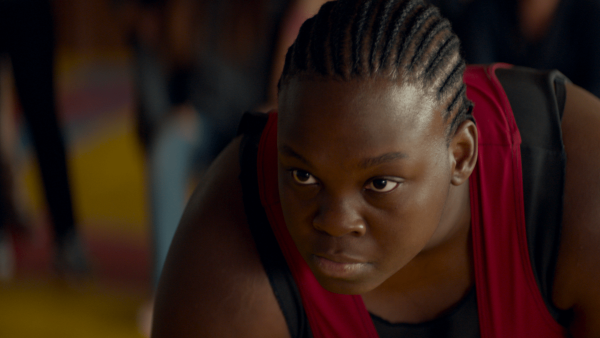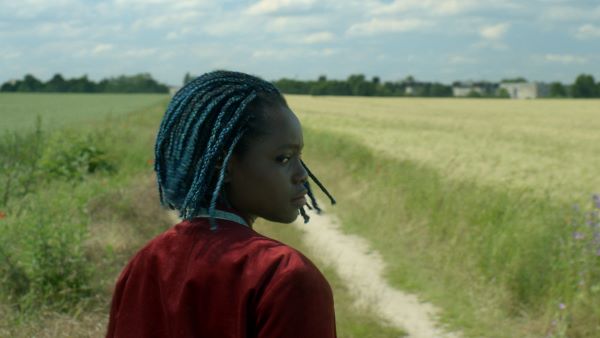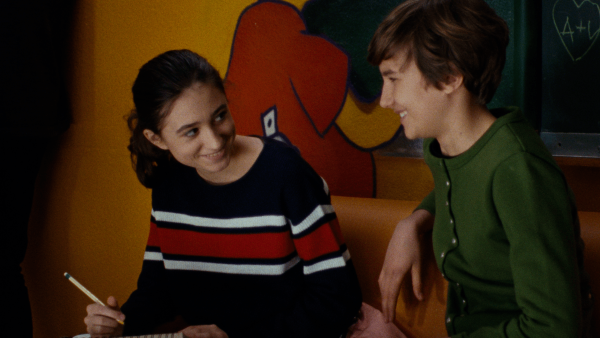New York City’s annual Rendez-Vous with French Cinema, presented by Film at Lincoln Center and Unifrance, offers some low-key selections this year, with a spotlight on women directors, people of color, and coming-of-age stories, a festival staple. Many of this year’s selections will be released Stateside in the following moths, including Xavier Giannoli’s Lost Illusions, which just swept the French film industry’s César Awards, and Fire, with Juliette Binoche and Vincent Lindon, fresh off its Best Director win last month for Claire Denis at the Berlin Film Festival. The following sample includes a recent role by one France’s biggest (and controversial) stars, another made by an emerging filmmaker, and the recent work from a director returning to the festival.
Robust
Constance Meyer’s character study handles a familiar odd-couple story with charm, restraint, and tones of hope and melancholy skillfully braided together. A young Black woman and semi-professional wrestler, Aïssa (Déborah Lukumuena), takes on the temporary job of bodyguard for a drunken White movie star on a deep downswing, Georges (Gérard Depardieu), and quickly finds that she’ll also have to play the role of confidant, babysitter, and preventer of disastrous outcomes—Georges has a habit of wandering into all kinds of danger. Levelheaded and smart, Aïssa learns to cope with her employer’s erratic behavior and even develops a wary affection for him. For all his bluster (“I like being a fucker,” he sneers at one point), Georges is a loving father to a small child, something of a wit, and in his own egotistical way genuinely interested in the woman who calmly saves him from attackers, health scares, and his own worst instincts.
The film tracks the two’s encounters and their very different lives with a light touch. Lukumuena ably embodies a solid character who takes her caretaker role seriously while moving up in her wrestling career and entering a tentative relationship with a skinny young man probably not as wise as herself. Depardieu brings pathos and depth to a part that he could easily play cartoonishly. A prolonged moment where Georges looks in the mirror and sizes up what he sees feels inescapably honest and sad. The two actors have strong chemistry, and their scenes together are often touching and deadpan funny. In their scenes apart, the film contrasts their physiques, hers strong and tough under the extra weight, his collapsing (a movie director’s insistence that Georges take fencing lessons seems like a risky proposition). Robust’s striking choral score adds both notes of warmth of disquiet to the story. When Georges and Aïssa move on, as they must, each has had a quiet impact on the other. The movie seems to say that although all human arrangements are temporary, we touch each other’s lives in ways we can’t always understand or articulate.
The Horizon
Although it also focuses on a young Frenchwoman of color undergoing a coming of age, Emilie Carpentier’s The Horizon (L’horizon) is a much looser affair, from the shaky handheld camera to the raw emotions on display. Adja (Tracy Gotoas) is half-heartedly engaged in caretaker/nursing study, wanting to work with children instead of the elderly but not really taking the steps she needs to make the move. She’s a little at loose ends and longs to have fun, and the movie spends a lot of time with her partying with friends and singing along to hip-hop. Adja’s best pote is a social media star (or at least a social media addict), and her brother is a budding pro footballer. When those two start a dalliance, Adja feels insecure and calls her pal out in a fit of temper. In her discontented state, Adja falls for Arthur (Sylvain Le Gall) a handsome young colleague at the hospital who helps her get over a patient’s death. More importantly, he enlists her in a campaign to stop the construction of a suburban development called Dream City. Before you know it, Adja and Arthur have gone full eco-warrior, blowing off studies and jobs to join demonstrations, face down bulldozers, challenge judge in a courtroom, and flee from angry cops—when they’re not making blissful love in a makeshift structure in the woods.
L’Horizon’s episodic, freewheeling structure sometimes sharpens its emotional urgency, sometimes distracts from it. Latent anger surfaces in Adja’s explosive temper tantrums, outbursts that the movie dwells on but doesn’t really explain. Are they signs of a young woman blowing off steam, a reaction to family pressure, or a response to social injustice? The filmmaker seems to appreciate the young activists’ passion, but more pragmatic types will wonder what how effective their long, very Gallic speeches and incendiary acting up really are. Scenes of Arthur and Adja ripping up papers, screaming, and spitting in the judge’s chambers will have law-and-order types calling for the water cannons. L’Horizon presents the joy of youthful idealism and its unruly, not very sophisticated downside, perhaps less evenly than it means to.
Petite Solange
Petite Solange also relies on handheld camerawork as it offers a restrained, melancholy story of a young girl suffering through her parents’ divorce. Thirteen-year-old Solange (Jade Springer) goes to middle school and enjoys hanging out with her best friend, but her suspicions mount that something isn’t right at home between her aging bohemian parents. Maman (Léa Drucker), a brittle actress of some local renown, sulks in her bedroom; Papa (Philippe Katerine, bizarrely styled with flamboyant muttonchops and combover) sells musical instruments and rather improbably enters a dalliance with his assistant at the store. Sensing trouble, Solange’s brother decamps for Madrid, leaving Solange to face the fallout of her parents’ collapsing marriage.Scenes unfold of Solange unhappier and unhappier as the film progresses. Schooldays pass in misery. The girl’s self-absorbed parents swat away her complaints and questions. Matters come to a head that wields some power until director Axelle Ropert (The Wolberg Family, which screened at 2010’s Rendez-Vous) abruptly shifts focus and brings in a resolution that seems to belong to a completely different movie. Still, Petite Solange is moving and invites you feel for its confused, sorrowful central character faced with adult troubles she doesn’t understand as it sensitively depicts the limited scope of early adolescence.
Rendez-vous with French Cinema runs from March 3–13.



















Leave A Comment